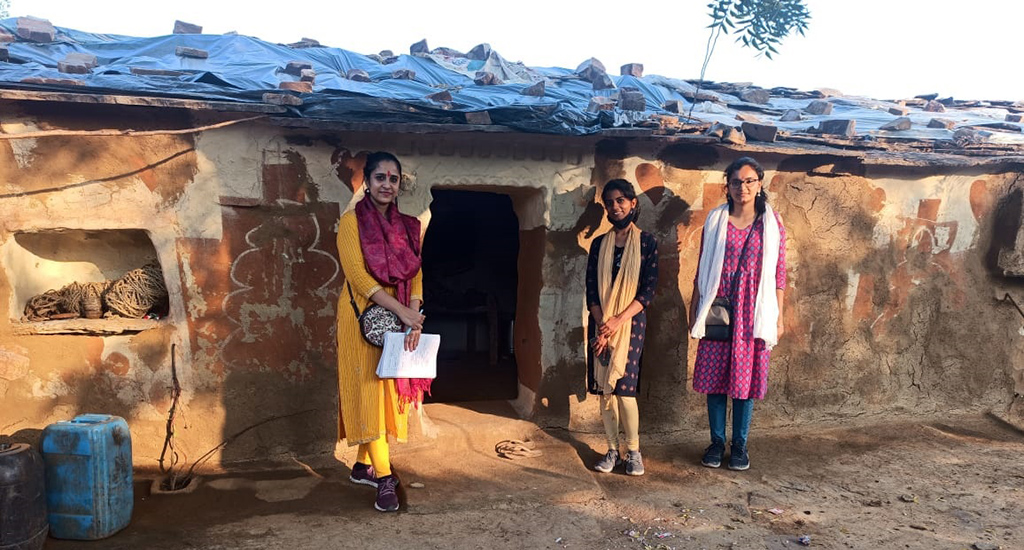
A veil won’t cloud her vision
A development management student is inspired by a strong and bold former woman panchayat leader who overcame all odds in a highly patriarchal society to develop a model village.

A development management student is inspired by a strong and bold former woman panchayat leader who overcame all odds in a highly patriarchal society to develop a model village.
It’s enlightening to witness gender equality and women’s empowerment at practice in a village – though the very woman who practices it may not have heard the terms.
Meet Shashi Prabha Tomar, a dynamic woman, who contested local elections about a decade ago in Ambah administrative block in the Morena district of Madhya Pradesh.
In the patriarchal community, she faced a backlash even for contesting. You can imagine how it would have been when she won.
However, Tomar’s strong willpower enabled her to serve her community and uplift the conditions of women in her village. Her determination made her surpass all odds and come out with flying colours.
Tomar served as the panchayat president from 2004 to 2009. Fifteen years ago, societal pressures shackled Tomar but not her vision. As a woman panchayat leader, she was a one-woman army when it came to working for the development of her village.
She exuded fearlessness and confidence when she narrated her life story. According to Tomar, the ghungat (a veil to cover her head) is obligatory for every married woman, since societal custom dictates it.
Though she wore the ghunghat, she didn’t hide behind it. She didn’t allow it to stop her tremendous ambitions to bring change to society. She believed change could only occur when a woman started a conversation with her family. Even though as development management students we had learnt about gender equality, it was something else altogether watching Tomar practice it.
I tried to imagine how difficult it would have been for her to be in a position to govern the system while facing humiliation. Because even today, the concept of ‘sarpanch-pati’ prevails in the district. In one of the gram sabha meetings that I attended, the woman sarpanch was not present. Her husband represented her in the gram sabha proceedings.
More than 10 years ago, Tomar overcame the same bias through sheer perseverance.

And it bore fruit. Soon people recognised her sincere efforts and respected her. (ALSO READ: Woman panchayat chief on course to transform village)
During our conversation, Tomar mentioned how she was proactive in building water resources so that no woman would have to walk several kilometres to bring water for her family’s needs.
She was concerned about children’s education. So, she even went to the teachers’ home and asked why they were not in school during school hours in case of uninformed teacher absenteeism. She shared that while she didn’t get the opportunity to study beyond class X, she wanted to ensure that this should not happen with other children due to a lack of infrastructure.
During her tenure, Tomar continuously raised her voice right from the gram sabha to the chief minister’s office for building good infrastructure, library and playground in the school’s vicinity. She wanted to make sure that no child was left behind. She wanted an overall growth of each child.
Determined and sincere towards her idea of developing a village and faith in herself, she put all her efforts into making a self-sufficient village.
Tomar’s model village began inspiring surrounding villages facing similar challenges. Despite prevalent patriarchal norms, she not only stood for local elections but ended up becoming the first female head of her panchayat. Adding a feather to her hat, her panchayat won the award of ‘Adarsh Gram Panchayat’ during her tenure. She received many such awards during her term.

President A.P.J. Abdul Kalam recognised her efforts, inviting her to the Rashtrapati Bhawan. Inspired by Rani Laxmi Bai’s stories, she remained courageous when working for her people. She said, “Kisi ka dam hai to rokke dikhaye, mai sherni hoon, kabhi har nai manungi.” (I dare anyone to stop me, I am a tigress, I will never accept defeat)
Due to Tomar’s poor health, she didn’t contest any further elections. However, with her health improving now, her aspirations are back as she aims to become a Member of the Legislative Assembly (MLA). She feels that she will not see the envisioned change unless she enters the system.
Tomar is a role model not only to me but for many women in her village. And you can see why that is. Her principles give many young people strong notions of how a woman can contribute to society by removing the gender stereotyping roles and bringing gender equality into people’s minds.
The lead image at the top of this page shows author Suchandana Roy and her friends during a rural immersion programme (Photo courtesy Suchandana Roy)
Suchandana Roy is pursuing a post graduate programme in Indian School of Development Management.